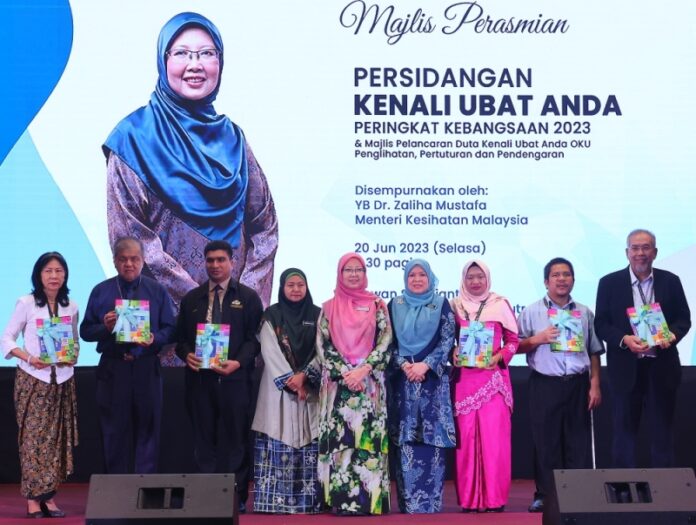PUTRAJAYA, June 20 — Six persons with disabilities (PwD) will be appointed as ‘Know Your Medicine’ ambassadors to provide accurate and authentic information about medicines to people with hearing, sight and speech disabilities, says Health Minister Dr Zaliha Mustafa.
She said the selected individuals would undergo structured and comprehensive training in order to better understand and be able to share basic information about medicines.
According to Dr Zaliha, the ambassadors will act as community health agents to assist the Ministry of Health in disseminating this information to their respective communities.
“This is the Ministry of Health’s commitment to ensure that all Malaysians are accorded their rights and provided with accurate and authentic information about health, especially with regard to the rational use of medicines,” she said when officiating the 2023 Know Your Medicine Conference at the national-level here today.
The chosen ambassadors would be representatives from the National Council for the Blind Malaysia (NCBM), the Malaysian Association for the Blind (MAB) and the Malaysian Federation of the Deaf (MFD), she added.
“These ambassadors will share with their respective communities about the importance of taking registered medicines, the right way to take medicine, the right way to deliver medicine, beware of buying medicine online and seeking the advice of a pharmacist if there is an issue related to medicines,” she said.
The ambassador programme for the disabled is a follow-up to the successful Know Your Medicine Ambassador programme launched in 2012 which aims to empower influential community representatives to deliver basic information related to medicines.
Since its launch, the number of trained ambassadors has increased from 145 in 2012 to 1,775 in 2022.
Siti Huraizah Ruslan, 39, from MAB, said the programme would be able to help the visually impaired to get accurate information related to medicines since crowded medicine dispensaries in hospitals and health clinics limited the interaction time between the group and pharmacists to get further clarification.
“We visually impaired people face problems when collecting medicine at the counters because there is limited time to get further and clear explanations from the pharmacist.
“So with the disabled themselves appointed as ambassadors, that makes it easier for information related to medicines to be disseminated quickly and widely to their respective communities so that they know the correct and safe way to consume them,” she said.
MFD president Mohammad Sazali Shaari, 65, said individuals with hearing and speech impairment faced difficulties in understanding how to take different types of medicines considering that they could only rely on their sight to look at labels and any instructions provided.
“People with hearing and speech impairment find it difficult to get more information about medicines, for example, on how to take them, because there are different ways of doing so.
“So by having ambassadors to the community, we can recognise how to use medicine correctly through sign language,” he said.
He also suggested that sign language interpreters be placed in health facilities to facilitate communication between health workers and those with hearing and speech disabilities since they could not hear or receive proper explanations from medical personnel about the health problems they faced.
















